




















































Iamimmensely proud of the good work we have done in championing equality, diversity and opportunity. This work was first led very ably by Sarah Cooke of Mills & Reeve and now by Scott Smith of Howes Percival. Building on Sarah’s foundations, Scott has launched an EDI Network. The first event was very successful and the network will help provide all in our minority communities with role models, visibility and connections.
On Friday 21st April, we will be celebrating legal excellence in Cambridgeshire with our Annual Dinner and LEA2023. We have received more entrants than ever before. Huge thanks to Colin Jones of HCR Hewitsons for leading the independent judging panel and also to his fellow judges. Many thanks as ever to our Platinum Sponsor Rathbones and to all our other sponsors.

Work continues on our merger with Peterborough and
District Law Society. We hope to complete this before our AGM on Tuesday 9th May
In February, CLS entered into a twinning agreement with Barcelona Bar Association. This is only the first of what I hope will be several such arrangements across Europe. There will be opportunities for secondments under such arrangements.
I am also delighted to announce that James Allen of Birketts has agreed to become our Vice-President. His appointment at the forthcoming AGM will help to ensure that CLS has the leadership it deserves going forwards.

There are always opportunities for members to join our fantastic team. We are always on the look-out for competent ‘doers’ with enthusiasm, who are team players. If interested in joining the Committee please contact me.
President
Michael Frape Ashtons Legal
Vice-President
James Allen Birketts
Honorary Secretary
Emma Bowman Howes Percival
Treasurer
Gary Hanson
Barristers Rep
Joshua Walters Fenners Chambers
Corporate Partnerships Officers
John Wright Woodfines
Corporate Sponsorships Officer
Joshua Walters Fenners Chambers
Equality, Diversity & Inclusion Officer
Scott Smith Howes Percival
International Relations Officer
Melissa Barker Birketts
In House Lawyers Rep
Anna Mortenson Nichino Europe
Junior Lawyers Division Representative
Jonathan Dattani Woodfines
LEA Officer
Raina Victor Birketts
L&D Officer
Chris Hoole Appleyard Lees
Parliamentary Liaison Officer
Chris Thomas Appleyard Lees
Patent Attorneys Rep
Anwar Gilani Venner Shipley
PR & Social Media Officer
Josie Beal Birketts
Publications Editor
Kate Harris Birketts
Social Events Officer
Joanna Cotgrove Ashtons Legal University Liaison Officer
Kamakshi Puri Cambridge University Student
Website Officer
Charlotte Vallins Ashtons Legal Administrator
Penelope Harrington
MEETINGS 2023
Tuesday 9th May
AGM followed by a Committee Meeting
5.30pm on Zoom
EVENTS 2023
Social
Friday 21st April
Gala Dinner & Legal Excellence Awards 2023

King’s College, King’s Parade, Cambridge, CB2 1ST
6.30pm
Wednesday 12th July
Garden Party
Trinity Hall, Trinity Lane, Cambridge, CB2 1TJ
6.00pm
L & D
Tuesday 23 May
Webinar: “The Taxonomy of Estoppel - promissory, representational, conventional and proprietary: Ingredients and outcomes”.

Presented by Anthony Tanney, Fenners Chambers
12.30pm on Zoom
The Law Society’s Money Laundering Task Force: what we do, why it matters, how we can help each other.
In September, I returned to the chair of the Money Laundering Task Force after 4 years, when my colleague Amasis Saba held the role. He’s done an amazing job, in the face of increased pressure from government, law enforcement and regulators for Solicitors to show they are compliant with the Anti Money Laundering Regime and that the measures they have in place are effective.
The majority of the task force are practitioners, falling into one of three categories. We have people who run or work within a firm’s compliance team, we have members who often advise clients on how to comply with the requirements, and we have some members who represent people accused of money laundering. We also have two members who are from academia, and an observer member who is a Scottish Solicitor. This mix of specialisms means that our views are balanced, not just looking at how we comply, but most importantly I feel for the Law Society, considering the rights of the public, who are, after all, most likely not money launderers or funding terrorism. A couple of years ago we expanded the group to include specialists in Sanctions, an issue which has risen up the priority list for Compliance Officers.
The role of the Money Laundering Task Force is to advise on all matters relating to money laundering and Sanctions including:
• to advise on guidance to solicitors about their professional and legal duties
• to advise on the approach the Society should take in responding to proposals for legislative change from government or elsewhere and in promoting changes to legislation; and
• to comment on and review all anti money laundering (AML) and
Sanctions related consultations sent to the Society.
It is perhaps worth noting that the Law Society is a Statutory Professional Body Supervisor (PBS), which means that although the enforcement responsibilities of the role have been delegated to the Solicitors Regulation Authority (SRA), the Society remains responsible for raising awareness and educating and supporting Solicitors. In line with that, the members of the Task Force will get involved in writing guidance and delivering training for members.
Most people are not money launderers, but the damage they do is immense. It affects families, communities, vulnerable people as well as local and national economies. It is right the government requires there to be effective action taken to stop criminals from abusing the legal services sector to launder their illicit funds. But at the same time the expectations of us, and our clients, need to be proportionate, and risk based. As such, a strong focus of the Law Society’s and the Task Force’s work is holding any new proposed laws, plans or guidance to that standard.
It is vital for our work that we can understand the challenges which the whole of the profession face. There are remarkable differences between the risks which different firms face, whether small firms working in their local area, or international firms with offices all over the world. The clients we have also represent different risk, whether private individuals, SME businesses, or companies registered overseas. We want to work with you to support your members, and to reflect their views and challenges in our work.
Following our recent meeting with the LLS, we will seek, where time and capacity permits, views on proposed consultation from LLS and we will also
endeavour to provide information to Societies to enable them to prepare their own responses.
We are keen to establish an email group to enable communication between us and you. We will use this group to inform you about upcoming events, changes in the law and relevant consultations. To receive our AML Update please register at Anti-money laundering | The Law Society Add to My LS account.
Again, following feedback from both the Task Force, and LLS, if we are able, we’re keen to come along and speak to your society whether at committee meetings, or conferences.
The Task Force will be looking for more members. This year, a few of our longstanding members terms come to an end, and we expect to have several vacancies. Adverts will be published in April, and we’d be grateful if you could circulate this to your members. We’d also really like to hear from any committees or members that:
• Have views on proposed future legislation;
• Find any issues with the Legal Sector Affinity Group (LSAG) guidance, where you think it is inconsistent or confusing; or
• Believe that you have been unfairly criticised by the SRA, particularly where you consider their approach is not risk based, or in line with the law/guidance.
I’m really looking forward to the next few years, working in partnership with you all to keep AML workable and proportionate, and stop Solicitors becoming victims of criminals.
Amy Bell Money Laundering Taskforce Chair The Law Society
Earlierthis year, our Board agreed the final rules which will, from 1 October, bring the Solicitors Indemnity Fund (SIF) under our control and make sure clients continue to be protected for any claims made more than six years after a firm closes.
Of course getting to this point has not been a quick process. Since the Law Society first decided to close SIF - and responsibility for the fund then passed to us in 2006 - there has been extensive work carried out to consider future options.
In recent years we have run multiple public consultations, hosted hundreds of meetings, and engaged with thousands of stakeholders – we hope some of you were among them. Although there was extensive debate about the design of any future arrangements, there was a consensus that people valued the current level of consumer protection and wanted it to continue in some form.
be protected in the future – in fact if anything the process by which their claims are resolved should become easier.
One issue with SIF is that it is not efficient to have a separate entity providing such a niche consumer protection function dealing with a low number of claims. This has resulted in money that should be available to pay claims instead going towards the running and administration costs of the fund. Change was required and bringing future arrangements inhouse should mean we can make things more efficient and effective.
Several people flagged in our most recent consultation that we are not experts in the dayto-day running of an indemnity scheme. We agree. While our experience and expertise in running the Compensation Fund will be useful in informing our oversight of the future scheme, we need people with the right skills to handle operational delivery.
Paul Philip SRA Chief Executive
The challenge therefore has been how we design future arrangements so they fulfil this brief, while being proportionate and not placing undue risk on the public or too much cost burden on the profession.
While the indemnity fund rules provide a framework for how the new scheme will operate – we know that many people have questions about the practical minutiae of how the new arrangements will work day-to-day.
Importantly if clients have to make a claim on the fund, we don’t see much changing compared to the current arrangements. If they are protected now, then they will
That is why we are already working with specialists to both help us design the practical detail of how the scheme will operate and also plan for how and where we will need ongoing support to run the scheme.
As this work continues, we will release more specific information on how the scheme will work in practice.
Overall we are making good progress, and are on course to take control of SIF from the start of October. The public will therefore continue to be able to have confidence that should the worst happen – even many years after using a law firm we regulate – they will still have protections in place.
...if clients have to make a claim on the fund, we don’t see much changing compared to the current arrangements
Hello Cambridge, it’s my turn to speak to you in this issue, and I have an update on a matter that’s been occupying our minds for many years.

The passing of my father just over a year ago and more recently the passing of a former partner of my firm with whom I had worked closely has caused me to reflect on challenges to the rule of law. My father was part of a wartime generation, which had witnessed what happens when minorities are persecuted, the rule of law is undermined and democracy is curtailed. The response of his and my former partner’s generation to that descent into barbarism was, amongst other things, to entrench into law universal human rights applicable to all whatever their creed or colour. The most obvious example of that approach was the signing in November 1950 of the Convention for the Protection of Human Rights and Fundamental Freedoms, better known as the European Convention on Human Rights.
The tide of history is now sweeping in a different direction. An objective observer of world affairs and also affairs closer to home could only reasonably conclude that in recent years the rule of law has come under serious threat from populist politicians. They have sought to do so, because the rule of law is a key pillar of democracy. For example, Israel’s Prime Minister Benjamin Netanyahu is being prosecuted for an array of bribery, fraud and breach of trust offences. At the same time, the Israel government is seeking to reform the Supreme Court by enabling the Knesset to overrule its judgments by simple majority and by giving itself the power to appoint and
dismiss Supreme Court justices. Go figure, as they say.
That may be an extreme example of an attack on the rule of law, but it is certainly not an isolated example and sadly, it is also the case that the rule of law in the UK is also under attack. When I consider the threats to the rule of law, I am immediately reminded of the initial failure by the then Justice Secretary, Liz Truss, to defend the judiciary against a vitriolic attack by the Daily Mail under its notorious 2016 ‘Enemies of the People’ headline. I also recall that the article included a homophobic attack on Sir Terence Etherton. In more recent times, the Prime Minister and Government ministers including the Home Secretary have attacked lawyers by using the term ‘lefty lawyers’ in order to demean and mock human rights lawyers. They have even suggested that such lawyers are playing the system and that the justice system is ‘broken’. By denigrating lawyers and the justice system itself, the Government is stirring up popular discontent and thereby seeking to undermine the rule of law.
The Government has also shown that it does not respect international law. Examples include passing legislation giving it the power to breach the Northern Ireland Protocol to the Withdrawal Agreement and therefore breaching international law, but only in a ‘in a very specific and limited way’ as Brandon Lewis then Northern Ireland Secretary said at the time. More recently, the Government has
been unable to confirm that the Illegal Migrants Bill is compliant with the European Convention on Human Rights.
In terms of domestic law, there was the illegal prorogation of Parliament, which entailed Boris Johnson giving (at best) misleading advice to Her Majesty The Queen. During the Pandemic there was the flagrant and repeated breaches of the Covid Regulations at No. 10 Downing Street for which Boris Johnson became the first Prime Minister to be convicted of a criminal offence (albeit a minor one). He is now the subject of an investigation before the House of Commons’ Committee on Standards as to whether he misled Parliament, which is a serious allegation in a parliamentary democracy. It is surprising (at the very least) that the Prime Minister of a government, which imposed the most authoritarian laws since the Second World War, would breach those laws and allow those laws to be repeatedly breached by his own staff. What message does that send to the body politic about respect for the rule of law?
The rule of law is also under threat by the Government’s legislative programme including the Bill of Rights Bill and the Public Order Bill. The Bill of Rights Bill has been heavily criticised by legal commentators and would (if passed unamended) damage the rule of law by allowing the government to decide who should have the benefit of human rights. Did we not learn that human rights should apply to all? The Bill also grants public authorities the power to ignore rights where there are resource pressures and it makes it harder for individuals to assert their rights in court. It would also likely put the UK in breach of international law such as in respect of ‘Interim Measures’ issued by the ECHR.
The Public Order Bill includes various authoritarian measures including powers to restrict the right to protest,
It is surprising that the Prime Minister... would breach those laws and allow those laws to be repeatedly breached by his own staff. What message does that send to the body politic about respect for the rule of law?
such as the power to obtain serious disruption prevention orders to prevent protests taking place and the power to place conditions on the noise caused by a public protest. The right to protest is a fundamental democratic right, which should not be restricted in those ways. Another democratic right under threat is the right to go about one’s business without interference by the state, unless the state has reasonable grounds to do so. Consequently, the proposed power for the police to stop and search someone without suspicion is of particular concern.
What has struck me in recent years is that some of the rights and freedoms I had taken for granted are under threat by our own government. I had always assumed that they were ‘givens’ and that every right-thinking citizen supported the rule of law. It is evident that we can no longer assume that the UK Government necessarily supports all aspects of the rule of law, or (at least) it has a far more restrictive view of the rule of law than should be acceptable to right-thinking citizens. We must not forget that those rights are incredibly important to a properly functioning democracy and therefore any threat to the rule of law is a threat to democracy.
I had also always assumed that society was moving in a generally upwards trajectory. Of course, there would be bumps in the road and occasional wrong turns, but in broad terms we would be heading towards a fairer, more just and more equal society, and that the iniquities of the past would be vanquished. But I had forgotten the lessons of history and I was mistaken. It would appear that many (including many of those who govern us) do not agree with the norms of a liberal democracy including universal human rights and respect for the rule of law. It has become abundantly clear that the arguments in favour of universal rights and freedoms must be won anew by each new generation. The most obvious example of that being the reversal of abortion rights in many US States following the reversal of Roe v. Wade by the US Supreme Court.
The Police form an incredibly important part of the justice system. Consequently, Baroness Casey’s conclusion that the Metropolitan Police is institutionally racist, misogynist and homophobic is extremely concerning. Perhaps we should not be surprised by the findings given what we have learnt about the Met in recent times
through (amongst others) the cases of Sarah Everard as well as Bibaa Henry and Nicole Smallman. But how can this be the case in our capital in the third decade of the 21st Century?
We cannot assume that all will turn out for the best in the end. Do we want to live in a country where human rights are eroded and the rule of law diminished? Do we care sufficiently about minority communities to make a stand? In 1930s Europe, the most civilised country in the world elected to government a populist politician, who was contemptuous of the rule of law, democratic norms and minorities. His government had a democratic mandate and was therefore legitimate, but over time, through legislation and other measures, it stripped away rights and freedoms applicable to all and used the German police force and other organs of the state to enforce increasingly authoritarian laws and persecute minorities. If you want a more recent example of the degradation of a democratic state by undermining the rule of law, look no further than Putin’s Russia. If we do not struggle to maintain the rights and freedoms of my father’s era, we will see them eroded, diminished or worse.
 Jonathan Dattani Vice-President of the CJLD
Jonathan Dattani Vice-President of the CJLD
Our first event of 2023 was a bubbling success - we hosted “welcome back” drinks at The Grain & Hop Store to bring even the gloomiest of Mondays to a happy close. And there’s more brewing. We’ve got a lot of other great events up our sleeves. To give you a taste of what’s to come… gin tasting, punting and our infamous Pizza in the Park event will be back for 2023 along with our annual Autumn ball – get your glam on at this sell-out event that always promises a night of fun and fancy dress!
We’re back! The CJLD is a social and professional collective of young lawyers based in Cambridgeshire, and with a brand new Committee, we’re feeling fresh and ready to hit the ground running. We’re excited to be bringing junior lawyers of the East events, networking and learning opportunities left, right and centre IRL.
Our next event will be bowling at Tenpin Cambridge on Tuesday 28 March, and is open to members and non-members alike. If you are interested, please do get in touch at cambsjld@gmail.com!
If you’re new to Cambridgeshire and/or the legal world, joining CJLD is a great way to meet fellow young professionals – making friends and business connections, trying new things and seeing parts of Cambridgeshire
that you may not have otherwise known existed.
We are open to all Trainees, Paralegals, Legal Execs, Legal Apprentices, Students and NQs. Our goal is to encourage membership from as many different firms as possible to help you make those all-important connections with your peers.
Join us here!
What is the focus of the Social Entitlement Chamber and what drew you to sitting not only within Tribunals but within this particular chamber itself?
The Social Entitlement Chamber hears appeals regarding social security benefits such as Universal Credit and Personal Independence Payments and child support. The cases heard range from those concerning claims for Disability Living Allowance for children with disabilities to Appellants who are unhappy with their current benefits. We have tribunal hearing venues in both Cambridge and Peterborough and at its core the Chamber is there to ensure that people especially those in a vulnerable situation obtain their correct entitlement to benefits, which I find a very rewarding experience.
The Tribunal is inquisitorial in nature as those who bring forward cases usually don’t have advocates unlike the traditional courtroom setting. Judges are supported by tribunal members who have real experience of specific areas for example doctors or members with expertise on disability, which is key as this expertise is essential in understanding the complex regulations and importantly our non-legal

This issue, we speak to Andrew Brewer a full time judge and ‘Diversity and Community Relations Judge’ in the First Tier Tribunal (Social Entitlement Chamber) about equality, diversity and inclusion (“EDI”) within the Cambridge judiciary. Through his experiences, Andrew provides fascinating insights into his role as a Judge, whilst also shining a light on EDI within the judiciary as a whole and why he believes diversity is so essential to its success.
members provide expert insight into key elements of a case.
How did you begin your legal career and what led you to pursuing a role in Tribunals and the Judiciary? What types of alternative routes into judicial office are there?
I sat as a Fee-paid judge for many years. Fee-paid judges like DDJs and Recorders are part time and sit when available and required. Until I was appointed a salaried full-time judge, I was also in practice with several firms in Cambridge. Other Fee-paid judges in SEC combine sitting with us with other part-time judicial roles such as those mentioned or other tribunals e.g., the Employment Tribunal or the Immigration Appeal Tribunal. In effect, their full-time work is across several part-time judicial roles.
Whilst some of the higher Courts can feel intimidating for lay people, the Tribunals I sit in have a much more welcoming approach, partly as a result of the nature of the work we do. Appellants are rarely legally represented in our hearings and often, the Department of Work and Pensions does not send a representative which means that the hearing consists of
the tribunal and the Appellant. So, our role is to enable Appellants to explain their claims and circumstances to us whilst we, using our expertise, ask the relevant questions to see if they meet the qualifying conditions laid down in the regulations.
Sitting as a Judge on these tribunals can also be excellent training and experience for a career in the courts judiciary. Many tribunal and court posts are offered to judges through what is called an expression of interest (“EOI”). EOIs enable judges in one jurisdiction to apply and many of my colleagues have expanded their careers into different fields. Salaried positions must be applied for through the Judicial Appointments Commission though having Fee-paid experience helps. Recently, judges from this tribunal have been appointed DDJs. We have had a local Fee-paid judge appointed as a District Judge, another appointed as a Circuit judge and a third appointed as a DJ (Magistrates).
It must be right that in a democratic society, the judiciary reflects that
important in the Judiciary, are there initiatives in place to raise awareness and improve
society. For me, diversity in the judiciary is not about appointing for diversity but rather in encouraging members of the professions who might not see the judiciary as being for them.
I personally am interested in this at the stage of recruitment and retention. So, more solicitors apply for judicial office than barristers (45% to 39% of applicants in 2021-22) but of those recommended for appointment, only 27% were solicitors with 54% being barristers. So, why is that? There are about 8.55 times more solicitors than barristers and I believe that the recruitment numbers suggest that we need more solicitors applying for judicial office and making better applications.
The latest statistics show that Tribunals are leading the way on judicial diversity. In 2022, 58% of tribunal judges were women and 62% were solicitors. We lead by narrow margins in judges from ethnic minorities and judges with disabilities. The role of D and CR Judges like me is to encourage applications to increase that diversity.
There are many different diversity initiatives we operate such as the Judicial Work Shadowing Scheme, the Judicial Mentoring Scheme and the Pre-Application Judicial Education Programme to help encourage people to pursue not only a legal career but to consider a role within the Judiciary. We hope that by putting these initiatives in place we will make the legal environment less exclusionary and encourage a more diverse and inclusive generation of judges. I believe different experiences and backgrounds leads to new perceptions and ideas which is essential for a judicial role as it is always evolving and changing.
What advice would you give to anyone interested in gaining a place within the Judiciary? How would someone approach joining the Social Entitlement Chamber Tribunal in particular?
This is the work that I have taken up as a Diversity and Community Relations
Judge; to encourage more diverse applications for judicial office. Firstly, don’t be discouraged because you do not match the profile of the judges you see in your daily work. I didn’t match the profile when I was appointed. Sign up to the Judicial Appointments Commission alerts and look at the range of opportunities coming up. You will see bodies that you may never heard of before, but which offer challenging and rewarding work. Tribunals have greater diversity in our members in every test, more solicitors, more women judges, as well as greater diversity in ethnicity and disability than the courts.
The assessment process is based on an analysis of your skills and experience so learn about that process and how you can prepare for an application. The key thing is to have examples to justify your claims about your expertise so start noting your achievements, your good work and your skills as concrete examples you can call on when you apply.
There is also a competition about to start for Fee-paid judges in a number of tribunals including mine. Check out the JAC website for more information here: Vacancies | Judicial Appointments Commission
If you wish to discuss applying, please get in touch and I will give what guidance I can. In the South East Region we offer the opportunity to practitioners and students to observe a sitting and speak to the judge about the cases, their day to day work, judicial skills and the decision making process and their route to becoming a judge. Our regional office (rtjsoutheastsscs@ justice.gov.uk) will be able to assist.

We extend our thanks to Andrew for sharing his insights and wish him continued success in his role. For more information about some of the themes and initiatives mentioned above, take a look at the Judicial Diversity and Inclusion Strategy 2020-2025 link Judicial Diversity Strategy 2020 –2025 (judiciary.uk) and Diversity of the Judiciary link: Diversity of the judiciary: Legal professions, new appointments and current post-holders - 2022 Statistics - GOV.UK (www.gov.uk)
If you would like to get involved with our Diversity Matters initiative or our new network or if you have a story or opinion to share about your experience of EDI within the Cambridgeshire legal community please get in touch with Scott Smith our EDI officer (scott.smith@howespercival.com) or Penelope Harrington our administrator (admin@cambslaw.com)!
I’m five months into my role as President of the Law Society and I’ve seen and spoken to so many solicitors from all types of backgrounds who are either aspiring to be solicitors or are already in their chosen career.
Asthe first Muslim, first Asian and only the seventh woman President, I understand how important diversity is to the profession.
I’m a Northerner, originally from Bradford, and I’m from a working-class background. It is a given that diversity, social mobility and social inclusion are high on my agenda.
Indeed, improving diversity across the profession is one of my top priorities during my presidential year.
I want to understand better the barriers that firms and businesses are facing when trying to reach and promote diverse candidates, as well as identify the challenges facing those seeking to enter and progress through the sector.
It is clear there is a disparity in representation across firm types.
In small firms almost a quarter of all solicitors are from Black, Asian and minority ethnic backgrounds whereas just one in ten solicitors in the largest firms are from a Black, Asian or minority ethnic background.
Lack of progression in larger firms is an issue. Our figures show that nearly a third of sole practitioners are from Black, Asian and minority ethnic backgrounds.
Just, 8% of partners in the largest firms (which have 50+ partners) are Black, Asian or minority ethnic. This has only risen by 1% since 2014.
Our Race for Inclusion report identified several barriers to progressing to partnership, including a lack of sponsorship and guidance, differential allocation of good work opportunities and, more generally, not fitting in to the (predominantly white) culture of the company.
The desire to raise issues around diversity and discrimination, was also felt to be at odds with progressing to the level of partnership.
To improve the experiences of Black, Asian and minority ethnic solicitors, we recommend firms take steps to ensure they retain, develop and progress their employees.
We recommend firms monitor work allocation to ensure more equitable distribution of development opportunities, set targets for senior partners and for key points in the pipeline, and put in place a systematic approach to partner selection.
In practice, we’ve seen that firms are taking these recommendations on board to ensure Black, Asian and minority ethnic solicitors are able to progress in their career.
Clifford Chance have set ethnicity partner targets of 15% by 2025.
The percentage of minority ethnic partners has doubled in the firm, from 5.1% in 2017 to 10% in 2022.
Norton Rose Fulbright are aiming for 15% of their global partners and 25% of their partners in the UK firm to be from minority ethnic backgrounds.
They aim to achieve this through a targeted approach to recruitment, development and retention, and on continually focusing on efforts to drive inclusive behaviours and policies.
Late last year, advisory firm Extense published The 1% Study, which examined the under-representation of Black solicitors at senior levels in large law firms.
The Law Society supported the research, which found that just 1% of partners at major UK law firms (with more than 10 partners) identify as Black.
The report provides an action-focused, evidence-based guide for law firms on how to attract, retain, develop and progress Black talent to senior levels.
It identified five key actions law firms are not currently doing, which would encourage Black representation at the partnership level:
• tying executive compensation to diversity and inclusion outcomes
• providing supervisor-focused training, to improve inclusive linemanagement capability and confidence
• interrupting work allocation bias –through a combination of algorithmic technology and people solutions
• instigating formal sponsorship programmes, targeting underrepresented talent
• deploying targeted equitable support and career development opportunities
We know that making real, lasting change takes time. I encourage all solicitors to take forward the actions outlined into their own practices, so our profession truly reflects the society it seeks to serve.
Lubna Shuja President of the Law Society of England and Wales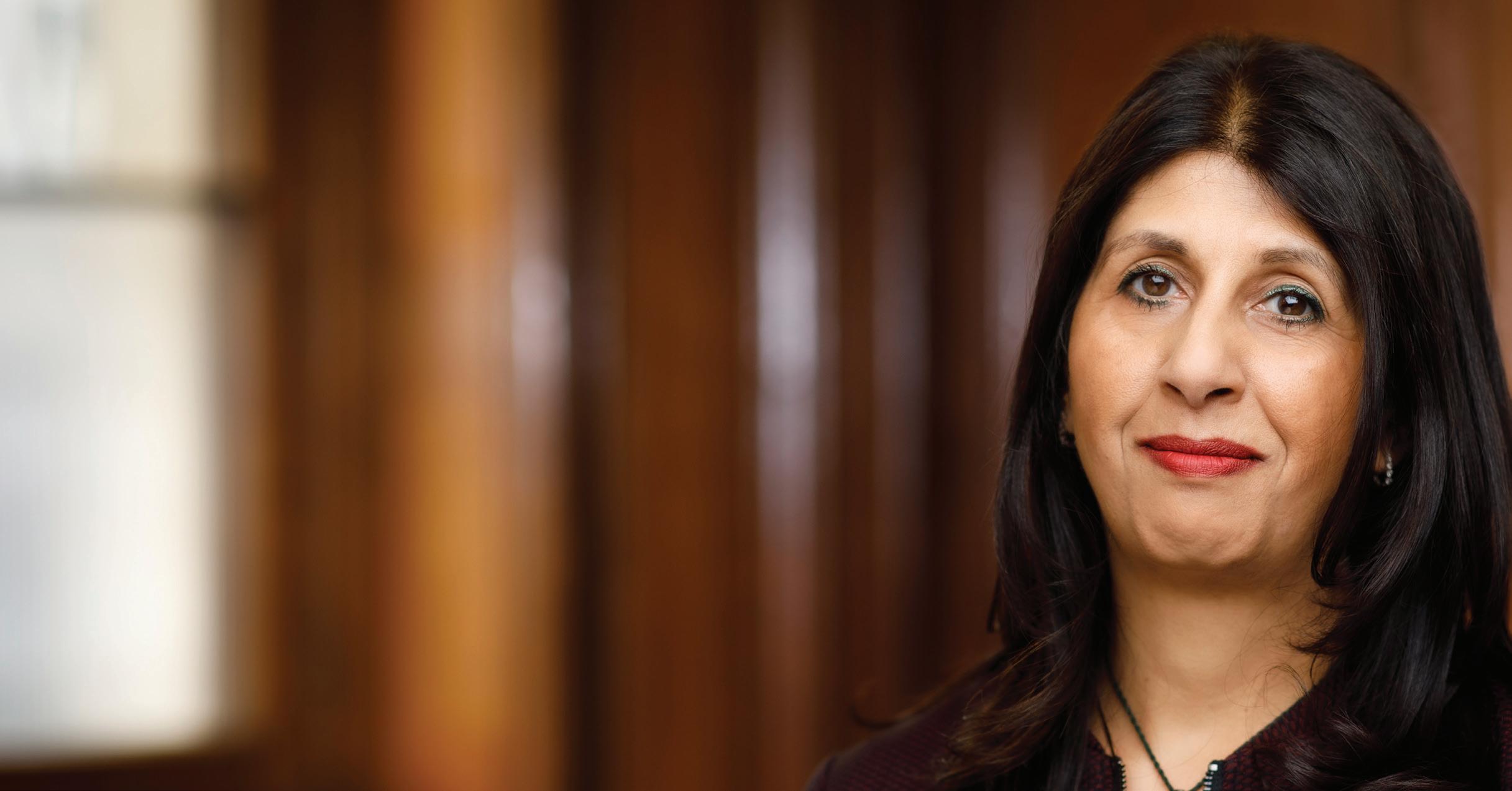
YOU ARE INVITED TO A
WEDNESDAY 12 th JULY
6 - 8:30PM
For a special evening on the Latham Lawn and River Terrace
Trinity Hall | Cambridge
DETAILS TO FOLLOW
Sponsored by


Growth for Greenwoods in Cambridge
Will Thomas joined Greenwoods in September 2022 with over a decade of experience in the industry, specialising in providing oneto-one residential property advice to clients. He has a reputation for being an expert in high-value and complex residential property matters, and his clients seek his advice on a range of issues, including sales and purchases, easements, covenants, and first registrations. Will joins Greenwoods to lead the residential property team and aims to cement Greenwoods' reputation as a first-class provider of bespoke residential property services.

Greenwoods welcomed Associate, Lauren Walker, to its Wealth Preservation team in December 2022.
Lauren has experience in complex legal matters and advises in relation to wills, estate planning, powers of attorney, probate or other related legal matters.


Senior Associate
Francesca JusBurke, a skilled Corporate and Commercial lawyer, joined Greenwoods in January 2023 from a top 50 London-based international law firm. She advises businesses and individuals on the full spectrum of corporate and commercial
work, varying from cross-border private M&A and shareholders’ agreements to terms and conditions of business and contract reviews. Her clients span a range of industry sectors, including technology, transport, real estate, retail and the food and drink industry in a number of jurisdictions. Francesca is fluent in French, a former international rower, a British Rowing coach assessor and a trustee of Diversity UK.
March 2023 saw further expansion for Greenwoods as Maria Corneli, a highly experienced residential property lawyer, joined the Residential Property team. Maria is registered with the Council for Licensed Conveyancers (CLC) and is completing her studies to qualify as a Licensed Conveyancer. Before joining Greenwoods, Maria worked for many years for the Italian Foreign Office, specialising in consular and legal matters in Rome and postings abroad.
Birketts LLP expands its International expertise
Birketts LLP has welcomed experienced solicitor, Alex Hunt, to its cross-office International Private Client Advisory Team. Joining as a Legal Director, Alex is based in Birketts’ Cambridge office.
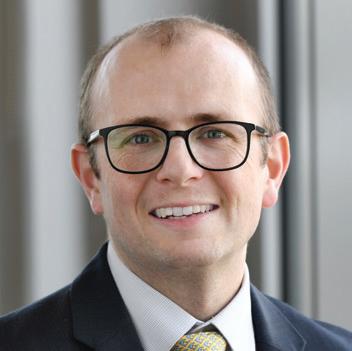
Alex qualified in 2011 and has spent 12 years advising clients in domestic and international tax planning and wealth management, onshore and offshore
trusts both in London & Cambridge, He now joins Birketts to focus on his chosen area of practice, international private client, adding senior support and expertise to Team Leader Deborah Carrivick.
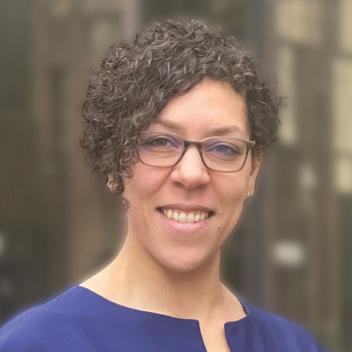

On joining Birketts, Alex said: “I am delighted to have joined the Birketts’ International Private Client Advisory Team and I look forward to helping Deborah and the rest of the team with the continued growth of the firm’s already strong cross-border practice.”
Appleyard Lees welcomes Parminder Lally to the Partnership Parminder is a patent attorney with a substantial reputation in Cambridge for helping academic institutions, startups and SMEs to protect their technological innovations. She specialises in computerimplemented inventions, particularly AI cases and was awarded the “Rising Star of the Year” award at last year’s Legal Excellence Awards.
Parminder said “From the moment I joined the firm, I felt that my contributions were valued and I realised quite quickly that I wanted to stay at the firm long-term. When I joined the patent profession, I didn’t think I would ever become a partner because I didn’t think that someone like me could, so I am doubly excited to be joining the partnership”
Julia Gwilt, founder of the Cambridge office said, “Parminder has helped us grow from two to over twenty in just five years. Her dedication to our clients and the profession is an inspiration to us all”.
Here is a round-up of the latest moves, promotions and achievements of Cambridgeshire Law Society’s members…
We are continuing to celebrate the successes of our member firms and to bring you news of the biggest deals and wins from across the County. Here’s what’s been going on this quarter…
Birketts advises Cambrionix on Foresight Group investment
Birketts’ Corporate Team has advised Cambrionix and its owners on its multi-million pound equity investment from Foresight Group.
Founded in 2007, Cambrionix is an industry-leading Cambridge-based designer of hardware and software solutions for the global mobile device management market. An estimated five million devices worldwide are connected to Cambrionix hardware at any one time.
Foresight Group’s investment comes from the £100 million Foresight East of England Fund, a fund developed to
support SMEs in the East of England and beyond. It will support the management team as they develop Cabrionix’s strategy of enabling mass deployment of mobile devices.
Adam Jones (Corporate) and Greg Allan (Corporate) led the team from Birketts and were supported by Alice Wooler (Corporate), Karl Pocock and Robbie Watson (Corporate Tax), and assisted by Samuel Varney and Leanna Romano (Corporate).
Victoria Tyson, Director of Cambrionix Holdings Limited, said: “We were thoroughly impressed with the level of service provided by Greg Allan, Adam Jones and Alice Wooler. The team
was incredibly knowledgeable and professional throughout the entire process. Communication was clear and timely, which helped to alleviate any concerns or questions we had along the way”.
“What stood out to us was the personalised and commercial approach the team took in handling our matter. They took the time to understand our unique situation and needs, and worked diligently to provide a solution that best met our goals. Overall, we were extremely satisfied with the service we received from Birketts and would highly recommend them to anyone in need of legal assistance.”
very recently joined the CLS committee as its Legal Excellence Awards officer. As the name suggests, my role is to work with the committee to coordinate the CLS’ biggest event of the year, the Legal Excellence Awards. Although most of the hard work for LEA 2023 has already been done, I am very much looking forward to helping to continue the legacy of the Legal Excellence Awards and contributing to the work of the CLS.
Though not quite born in Cambridgeshire (my family and I immigrated to the UK in 2005), I consider myself to be Cambridgeshire bred, having attended Swavesey Village College and Hills Road Sixth Form College. Following a few years in
IhaveNorwich for University, where I studied Law at the University of East Anglia, I returned to Cambridge. Like many law graduates, I had every intention of heading straight to London to start my legal career. However life had other plans and looking back, I am very grateful to have started my career in this beautiful city (recently named the best place to work in the UK by Glassdoor!).
Currently, I am a Solicitor in the Commercial & Technology team at Birketts LLP, having joined the firm as a trainee in 2019. I specialise in drafting and advising on a range of commercial contracts and providing advice on the protection and exploitation of intellectual property rights, particularly to clients within the life sciences and clean tech sectors. It is extremely rewarding to contribute to the ground-

breaking work taking place in the region and to be a part of the thriving legal scene. I am also very lucky to work with a great team, who are supportive, good-humoured and keep me well-fed with home-baked treats.
Outside of work, I love travelling and am a big foodie. I recently returned from an amazing trip to Bali and Australia, where I spent Christmas and welcomed in the New Year – the January blues were very real this year. After a five year break, I have also gotten back into dancing which I am thoroughly enjoying. Otherwise, I enjoy spending time with my family, our dog Chip, and my friends.
With less than a month to go to the LEA, the countdown is on to find out this year’s award winners and I hope you join us on the day to celebrate them.
The law was a second career for me - at school I was always a science enthusiast. Chemistry was my first love, but I slid inexorably into the engineering side of things. At A level I focused on Maths – Pure and Applied - and Physics, at Welbeck College, followed by 2 years at the Royal Military Academy Sandhurst. I was destined for a career in the engineering side of the Army, or so I thought. I gained a place at Selwyn College, Cambridge, and took up my place here after a year of soldiering in Germany. I left with an indifferent degree and four half-blues!
Various jobs followed, including project management and further posts in Germany, but I decided that I couldn’t see myself staying in long term, and I left at the age of 29, becoming a project engineer in industry. I was quite proud of some of the resourceful solutions I found to certain projects. Quite by accident I bumped into the law, and became fascinated by it: it was a challenge I wanted. I started studying on day release for the Law Society’s CPE, making up the hours on weekends.
Having passed the CPE, I found myself a post with Lanyon Bowdler, a large West Midlands firm, studying for my Finals whilst working my Articles. I think I was always destined for litigation: I loved the interplay of case management, evidence and the whole “poker playing” aspect of the case.
First valuable lesson: it isn’t about the facts. Some firms had scant regard for the merits of their client’s case, much less the facts. It was the litigation “game”, and the need to make those magic monthly targets. I did a lot of civil litigation: possession, boundary disputes, debt, contractual disputes, misrepresentation, even defamation. On balance I think I had a good eye for the merits of a case, and I didn’t lose many.
What I didn’t notice in all this time, as I gained experience, was the siren call of family work. It has a unique appeal, and before I knew it I had “crossed over”. It is immensely fulfilling, especially as family problems strike at the very heart
of people’s lives. I learned so much about human nature in serving others. Doing the extra training to allow me to undertake collaborative family work was another pivotal moment, as its principles seemed to me to epitomise how I thought family cases should be resolved.
Joining Miller Sands in Cambridge in 2005, I felt I had found my niche. Partnership followed in 2006, and after we survived the recession of 2008-2012
I became senior partner and co-owner in 2013. We did well, although it was always clear that a small high-street firm is vulnerable to market forces and unforeseen events.
During 2006 to 2018 I was very active in our local law society, serving twice as President and for four years as Treasurer. I was proud to spearhead a change in the constitution of the Society, so that all qualified lawyers became eligible for membership. I felt that as a community we had much to offer each other and “united we stand, divided we fall”. During the recession we grew, and stayed strong. Not all societies managed that.
I stood down from CLS in 2018, and in 2019 I sought a merger with a larger firm, to gain the stability and breadth of skills that a large firm offers. Talks with Buckles, my preference, went well, and we signed our agreement in February 2020, little knowing what lay ahead in March. I shudder to think how we would have fared in lockdown had we remained small and independent. I look back on three happy years with Buckles as part of a strong and highly respected family team, and at 70 I think it’s time to step down and have some “me time”.
I have kept in my desk drawer for 15 years a clipping from the Law Society Gazette, itself a quote from Sir Sydney Littlewood, then President of TLS. He said (paraphrasing):
“You need knowledge – you must know your law. You need an understanding of people – no two clients are quite the same. And lastly, you must have a genuine love for your fellow man. You must delight in helping clients in their troubles and difficulties… the joy of being a solicitor is in being able to help.”
Wise words – they struck me then and I would like to think, looking back over 30 years and more, that I have stayed true to them. I shall be doing a lot of DiY in retirement, and a lot of music – those who know me, know!

 Will Cowell
Will Cowell
On Friday 21 April 2023, we will be holding our Annual Gala Dinner at Kings College, Cambridge. We are very much looking forward to welcoming our members and their guests to celebrate the successes of Cambridgeshire’s legal community and the evening promises to be a fantastic event with Nick Emmerson, Vice-President of the Law Society of England and Wales joining us as a guest speaker.
We have had such a high standard of entries for the 2023 Legal Excellence Awards that our judging panel has decided not to issue a shortlist this year. Winners will be announced on the night!

We are very lucky to have some extremely generous sponsors of the 2023 Legal Excellence Awards. Here’s a reminder of who they are and the awards which are up for grabs:

TEAM AWARDS SPONSORS
★ BUSINESS LAW TEAM
★ CRIMINAL LAW TEAM
★ IN - HOUSE TEAM
★ LITIGATION TEAM
★ INTELLECTUAL PROPERTY/ IT LAW TEAM
★ PRIVATE CLIENT SERVICES
★ PROPERTY LAW TEAM
FIRM AWARDS SPONSORS

★ FIRM OF THE YEAR
INDIVIDUAL AWARDS
★ LIFETIME ACHIEVEMENT
★ TRAINEE LAWYER
★ RISING STAR (< 10 YEARS PQE)
★ SENIOR LAWYER (> 10 YEARS PQE)





★ OUTSTANDING SUPPORT STAFF MEMBER


We are continuing to raise money for our chosen charity, LawWorks to assist them with the admirable work that they continue to do to connect volunteer lawyers with people in need of legal advice who cannot afford to pay for this themselves. We will be fundraising at the Annual Gala Dinner so please give generously to allow LawWorks to help further access to justice for all.
Details of how to support LawWorks can be found here: www.lawworks.org.uk/solicitors-and-volunteers/get-involved/support-lawworks

I have read that most hospitals have a PALS office, but what exactly do they do?
PALS, stands for Patient Advice and Liaison Service. It is an English NHS Service which provides and offers confidential advice, support and information on health-related matters. It is a point of contact for patients, their relatives and carers. (There are similar organisations in Scotland and Wales).
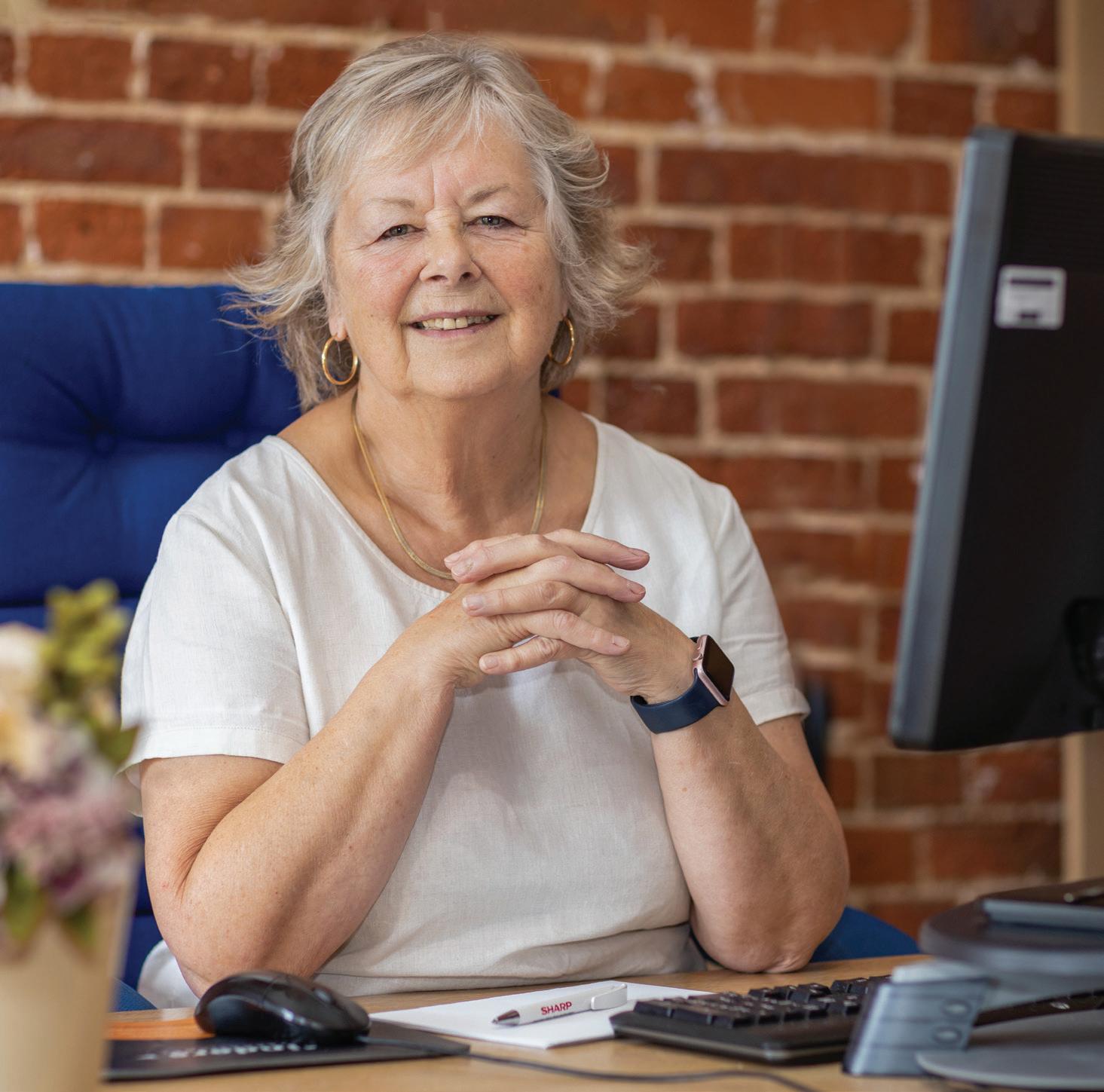
My parents are thinking of moving into a retirement home and we are looking to find out as much as we can about them, costs to buy or to rent, maintenance charges and what else is available on site for social activity etc. Where should we begin to look for information?
I have two elderly relatives and I am their only ‘younger’ generation relative. When sadly they pass away, I will have to make the arrangements that are needed. Where can I find some information that will tell me what I must do?
PALS are there if a person has any concerns about the service being received in hospital, have a complaint, or would like to give a compliment about service received. Usually, the PALS team have an appointment system which can be booked by ringing your local hospital.
A good place to begin is to visit Lottie.org. This organisation offers a free service that helps families and retirees find the UK's best elderly care homes and retirement living communities. Another organisation which can help is the Elderly Accommodation Council, a national charity with a mission to help older people make informed choices about meeting their housing and care www.eac.org
A A A A
In November 2022 Age UK produced a comprehensive guidebook titled ‘When someone dies’
This guide gives practical information about where to start and what to get done first, how to register the death and how to arrange a funeral. It also covers who to tell about the death and offers advice about financial and emotional support that might be available. The guide is forty-four pages long and can be downloaded from the Age UK website or you can call your local Age UK office and request one to be sent to you.
I am disabled but would like to see if it is possible for me to ride a motorbike? Where can I go for advice?
NABD is the association for disabled riders. It was set up in 1991 and now has over nine thousand members. Visit their website at www.nabd.org.uk or give them a call on 0844 415 4848 for further information.
Angela Gifford CEO www.ablecommunitycare.comT: 01603 764567
E: info@ablecommunitycare.com


Personal relationships are still the heartbeat of business success, despite the increasing use of technology. Personal relationships convey how we value one another. Personal relationships enable us to have empathy with one another’s situations.
In his seminal book, “How to win friends and influence people,” Dale Carnegie wrote
If there is any one secret of success, it lies in the ability to get the other person’s point of view and see things from that person’s angle as well as from your own.
Business relationships then are as much about understanding the challenges we all face in our daily encounters.
The search industry has seen significant changes in recent years. Massive consolidation has seen so many of the traditional search companies swallowed up into larger corporates. We have to find ways of differentiating our service offerings, building that trust in client relationships, and delivering services which conveyancers feel add value to their business.
Don’t get me wrong, consolidation has brought with it huge advances in technology and customer experience. Gone are the days of endlessly calling suppliers to order reports, collating them manually, printing off reams of paper and hand delivering the search to the office…. and good riddance too! With the exception of local authority searches, most of the reports are now available same day, with many returned in minutes.
The delivery platforms are slicker, smarter, more intuitive and spot potential risks that might need to be accounted for, and errors in search requests. But some of this technological advancement has come at the expense of good, old-fashioned customer service. The personal touch. Do we rely on technology too much? Are chat bots, apps and portals what our clients really want and need? What happens when things go wrong? People need reassurance, they need to be able to pick up the phone, or send an email, and feel as though somebody is taking a personal interest in resolving their issue rather than “chat” to a faceless bot or send messages via portals.
I recently won back a client from a rival supplier. When I asked what it was that brought them back to us they said that they felt as though they were a number, rather than a client. It was the personal touch that was missing from their communications; they didn’t feel as though they ever spoke to the same person twice. There wasn’t a familiar voice at the end of phone when things went wrong (as things inevitably do in conveyancing!).
In our experience 90% of orders go through with little to no intervention required. But that 10% is where relationships are made and broken. This is where knowledge, experience, and expertise really make a difference. Recognising that the conveyancer is almost certainly under pressure, whether it be from the client, agent or the other side, and being able to take that weight off and deal with the issue through to completion is a critical part of the business relationship. Whether it’s a query on a report back which requires clarification, or chasing up an expedited service. It's about trusting that the job is going to get done right, first time.
The challenge when introducing technology is that you take a step back from that personal touch. You risk losing the experience and expertise provided by the people when you are over-reliant on the technology. At Geodesys we have people who have been with us since the start, 25 years (and counting!), no amount of technology will replace their understanding and expertise. They are an integral part of our account management and customer service offering. They know the search industry inside out.
The key is getting the right combination of technology and people.
Going back to Dale Carnegie’s quote; the organisations who can empathise with the clients, and understand how to respond, will be the best at winning friends and influencing others.
Kay Toon is an Account Manager at Geodesys



As an Expert Witness, your remit is clear: although you’re instructed by either the defendant or claimant, your obligation is to the court. You should be independent, not partisan. But ensuring you maintain that independence isn’t always straightforward.
As we reported back in March, a litigation case where an expert seeking input from solicitor led to a conclusion that the expert was not independent – resulting in £225,000 of evidence being revoked.
The ruling was deemed a “shockwave” by Recorder Simon Jackson KC during the Lessons from the Courts panel session at our June 2022 conference. “It’s a stark reminder [to Expert Witnesses] of what their duties are in terms on compliance with the rules and honouring the declarations which they make”, Jackson remarked.
So, what went so wrong in this case? And how can the Expert Witness community ensure they learn from the ruling to preserve their integrity and avoid something similar happening again?
Independent vs partisan
The case in question, Patricia Andrews & Ors v Kronospan Limited [2022] EWHC 479 (QB), was a group litigation claiming nuisance. It involved a group of residents complaining that the owners of a nearby timber plant were contaminating their homes with dust. With dust a central part of the case, it comes as no surprise that the claimant’s solicitors instructed several experts in various areas of it, including Dust Analysis and Monitoring specialists.
After these Experts had been engaged for some time, the defendant’s solicitors became aware there had been contact between one of the claimant’s Dust Analysis and Monitoring experts and his instructing solicitors during the joint statement discussion period.
The expert in question had sent several drafts of the joint statement to the solicitors, seeking their views and input and received it from them, all without informing his Expert Witness counterpart.
Presiding over the case was Senior
Master Barbara Fontaine, who stated in her judgment: “the primary concern, having seen the communications between the Claimants’ solicitors and [the expert], is that [the expert’s] approach strongly suggest that he regards himself as an advocate for the Claimants, rather than as an independent expert whose primary obligation is to the court.”
To help reach her conclusion, Senior Master Fontaine examined two other cases involving misconduct by Expert Witnesses – both with very different outcomes.
In the first case, BDW Trading Ltd v Integral [2018] EWHC 1915 (TCC), a defendant’s expert revealed during cross-examination that he had sent a first draft of his joint statement to his instructing solicitors and had received feedback, making some changes to his draft as a result.
The judge in that case acknowledged that while the expert’s behaviour was a serious transgression, he genuinely wasn’t aware his behaviour was inappropriate and his communication with solicitors didn’t affect his opinion in any way.
At the opposite end of the spectrum, in Dana UK Axle Limited [2021] EWHC 1413 (TCC) experts receiving technical input from the instructing party at every stage in the process without revealing that to the other party. The indiscretion, meanwhile, only came to light halfway through the trial. Such a flagrant disregard for the impartiality rule meant that the judge had no real option but to disallow the evidence.
Reflecting on her resulting judgement in the Andrews vs Kronospan case, Fontaine explained she concluded that, “the expert’s evidence should be excluded because the court could have no confidence in his ability to act in accordance with his obligation as an expert authority.”
Is it ever OK to be in communication with solicitors?
Discussion between experts and
solicitors during the draft report stage is allowed. In fact, solicitors are usually involved to make sure they understand what’s being said and what each side’s case is. “That’s quite different from the joint statement process, which is an inviolable process where just the two experts discuss their views without outside interference”, explained Fontaine. Referring to the Technology and Construction Court (TCC) guide and its relevance to other cases, Fontaine noted: “It says while the party’s legal advisors may assist in identifying issues which the statement should address, they should not be involved in negotiating or drafting the experts’ joint statement […] unless there are serious concerns where the court may misunderstand or be misled by the terms of the joint statement.”
In such circumstances, solicitors from both sides must be involved.
Lessons from the courts
Be open – and get any communication with other parties in writing. Transparency and accountability are key: whatever is done needs to be done overtly.
Remember that the onus should be on solicitors to behave appropriately and uphold their duty to the court too. So, if they try to get involved in drafting the joint statement, remind them they are not allowed to be involved.
Make sure your declarations at the end of your report are up to date, or it could undermine you in court during cross examination.
Focus on the issues at hand. You should encourage solicitors to provide you with a list of the key areas of contention which should be discussed but should not be inviting comment on what is said.
Senior Master Fontaine and other senior legal professionals discussed the topic of Expert Witness integrity and more at our June 2022 conference, Lessons from the Courts, which is available to purchase now.
USER EMMA MITRAWe take a look at how the distinction between being an independent Expert Witness is crucial in a court case.
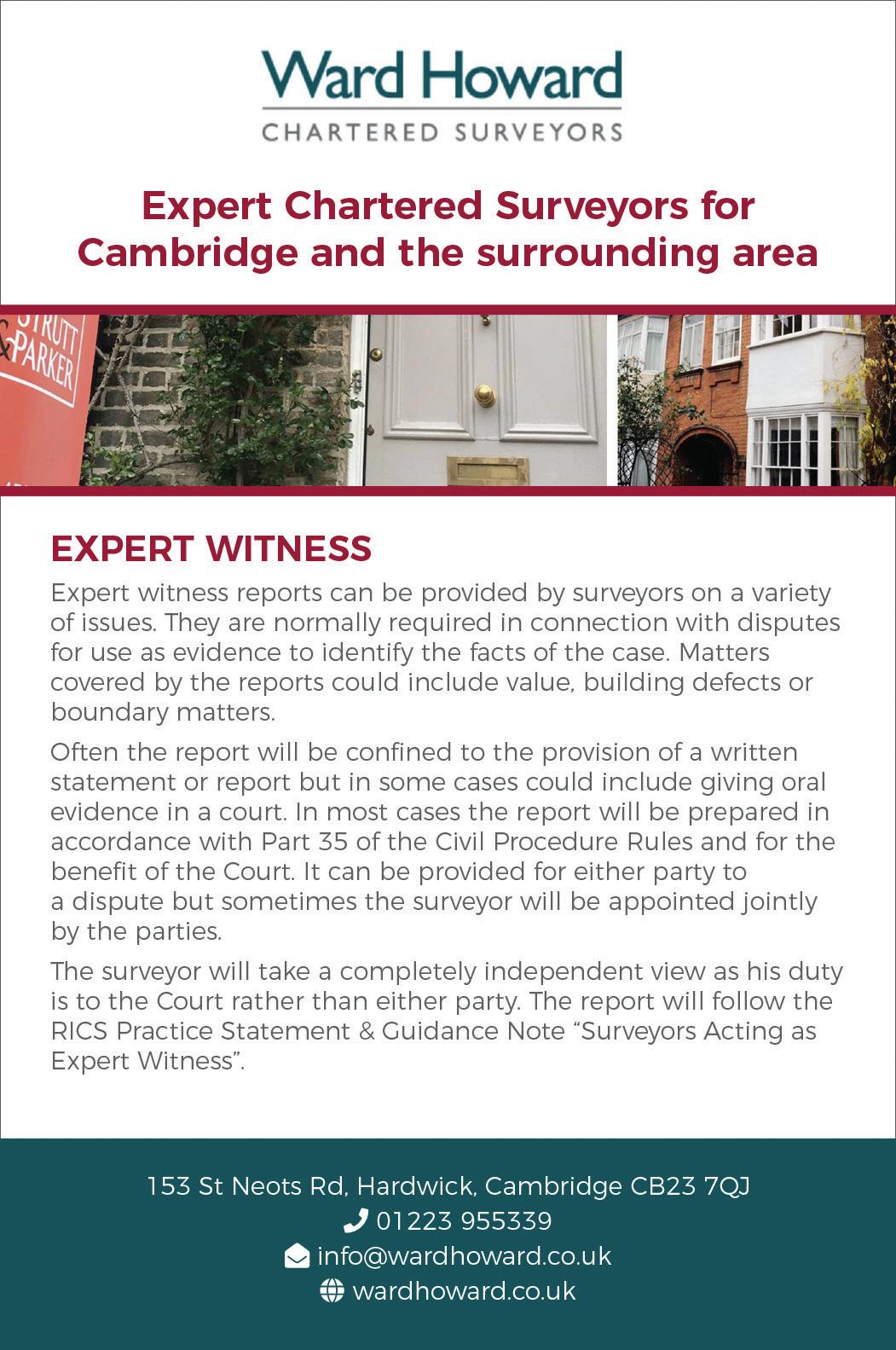



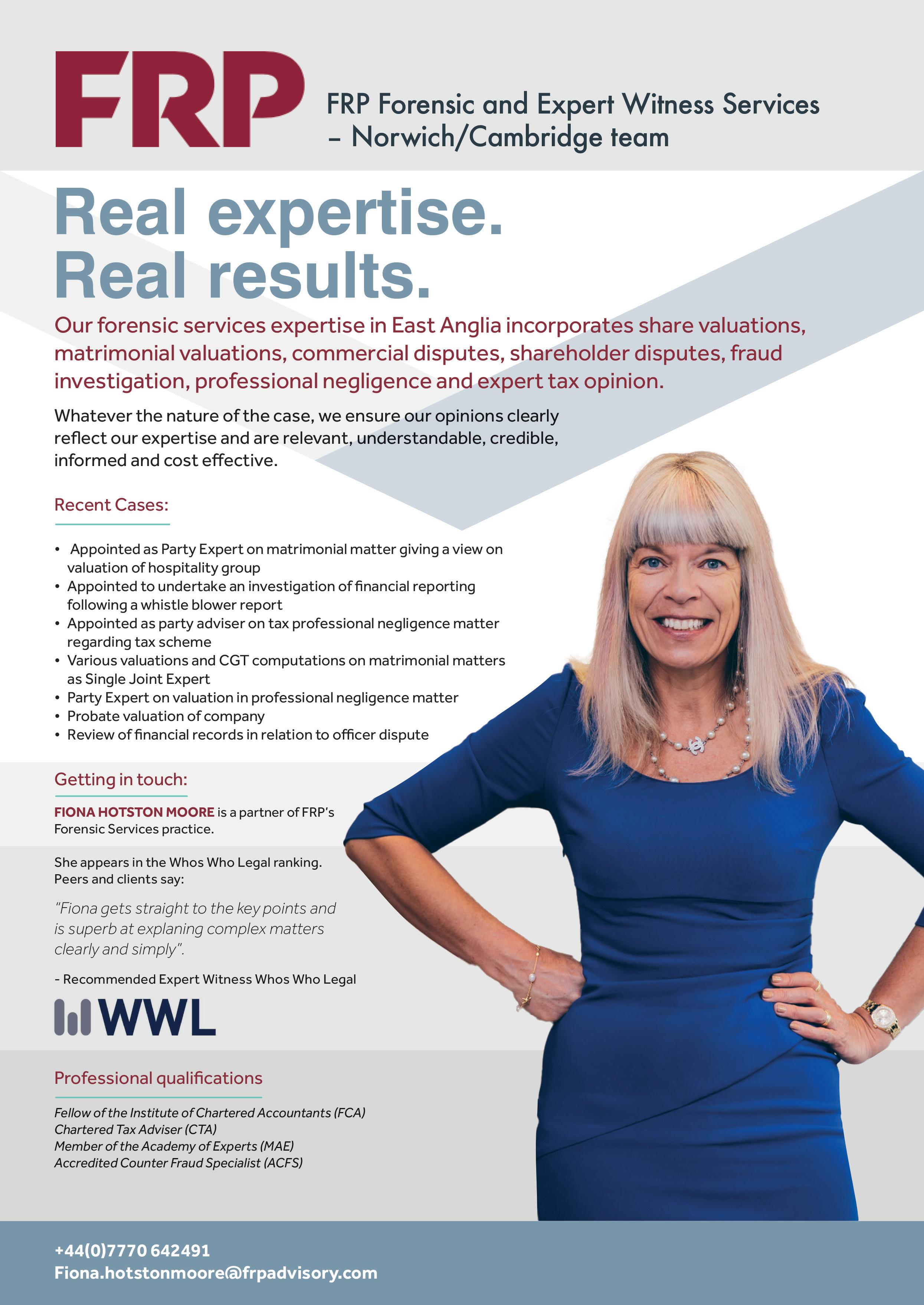

Thesurvey revealed a general feeling of unease and uncertainty. Nearly a third of respondents (30%) say they’re worried they’ll fail to make mortgage payments within the next year.
With recession worries and rising interest rates weighing heavily on the nation’s mortgage holders, our research showed the impact not only on decisions about buying or selling homes, but also on their financial wellbeing and mental health.
For conveyancing and property solicitors who rely on transaction volumes, it’s critical to identify ways to shield against volatile property market conditions and to help ease the overall anxieties of homeowners. We believe the answer may lie with digitisation and unlocking technology.
First, let’s take a closer look at what mortgage holders in the East of England told us:
l More than half (51%) say the current cost-of-living crisis is impacting their mental health (56% nationally)
l 72% are worried their offspring will be unable to get into the housing market, compared with 66% nationally
l Almost a third (31%) expect it will take significantly longer to pay off their mortgage than originally anticipated (36% nationally)
l To help manage monthly expenses, three in five (61%) have cut back on takeaways or meals out while 55% have reduced clothes shopping (compared to 60% and 52% nationally, respectively)
l Just over one in three (36%) expect to delay home renovation or improvement projects (35% nationally)
l 58% said they have paid more attention to their finances since interest rates started rising
In March, Dye & Durham commissioned an independent survey of 2,000 UK mortgage holders to understand the extent of the cost-of-living crisis and, specifically, how it is impacting short-term spending, long-term financial planning and day-to-day budgeting.
l 38% of those in the East of England could not afford to continue paying their mortgage for more than two months if a job loss affected the main earner in their household (compared to an average of 36%, across the whole of the UK)
l 30% of mortgage holders in the east (and nationally) are worried they’ll fail to make mortgage repayments within the next year
l More than half (55%) have reduced the personal usage of their car to save money
l 44% said they feel stuck/unhappy in their current home/life/job but can’t afford to change their circumstances.
It’s clear that economic uncertainty, including the effects of high interest rates, energy bills and increased costs overall, is weighing on the minds of the nation’s property owners - and the fallout cannot be underestimated.
Our survey data shows us that people across the UK are concerned about both their short- and long-term financial futures and, as such, have reduced spending, raided savings and are delaying major purchases.
Many UK law firms continue to manage much of their operations via manual or resource-intensive processes, which lack the necessary ease of access, seamless case management abilities or increased security measures to be truly productive and profitable.
Strategic plans to digitise processes were put on hold by many firms amid the peak in property transactions following the COVID-19 pandemic as they concentrated on taking cases from the offer phase through to completion.
The survey findings point to the fact that the UK property market may face considerable challenges due to consumers’ reservations, but there are steps that can be taken now to help weather the storm.
Firms that take action now, while transaction volumes are lower, to examine their resources and adopt tools designed to digitise and modernise workflows - and increase productivity and profitability - will have a significant head start on their competitors once the market returns to normal.
By adopting digital practice management tools, legal professionals can spend more time on revenuedriving tasks and less on non-billable administration like case management, client intake and invoicing.
At the same time, increasing the security of your information, reducing overall risk and providing a more modernised customer experience for clients can only benefit all – both now and in the future, when the market bounces back to previous levels.
If you’re interested in finding out ways you can protect your bottom line against market volatility, contact the Dye & Durham team today: http://bit.ly/3FotstY
www.dyedurham.co.uk
Using an online methodology, Danebury Research conducted a nationally representative survey of 2,000 UK based homeowners with a mortgage aged between 18 and 65. Fieldwork was conducted from 12th February to 16th February, 2023.
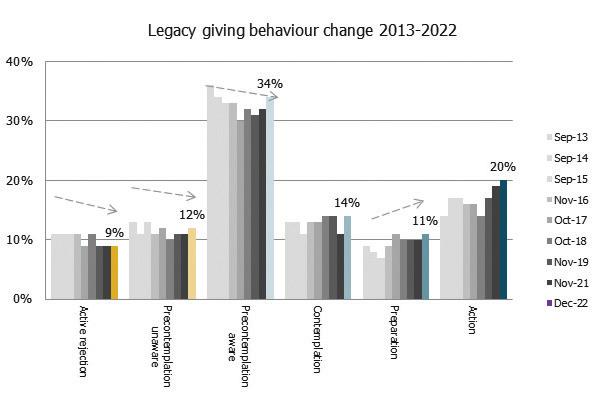
Legacy giving has risen by 43% over the past decade according to new research out today. 20% of UK charity supporters aged 40+ now say they have left a charitable gift in their Will compared with 14% in 2013. The research charts a steady rise in the proportion of people choosing to give from their Will over time.
Legal advisers play a critical role in making clients aware of the option of including a gift in their Will, with more than half of the giving public (54%) saying they have used or would use a solicitor or professional Will-writer to set out their final wishes.
The Remember A Charity consumer benchmarking research*, carried out by independent research firm OKO, surveys more than 2,000 charity donors aged 40+ to track legacy giving attitudes and behaviour year-on-year. The 2022 research released today found that:
• One in five supporters said they had included a charity in their Will (20%)
• Just over one in 10 said they are preparing to do so (11%)
• Fewer than one in 10 reject the concept altogether (9%).
The tracking research, which follows Prochaska’s Stages of Change model, shows forward movement over the years from donors’ rejection and lack of awareness through to awareness, contemplation, preparation and action (leaving a gift).**
Lucinda Frostick, Director at Remember A Charity, the consortium of 200 UK charities working to promote charitable gifts in Wills, says: “This continued growth in appetite for legacy giving is hugely encouraging, reflecting greater understanding of the option to pass on gifts to good causes alongside loved ones in a Will. It may take years –in some cases decades – for donations to filter through, but that income will be crucial in funding charitable services for generations to come.”

Just under two thirds of people
surveyed (63%) had already written a Will, with three in 10 of those having included a charitable donation (29%). Despite the economic climate, the
large majority of all respondents (80%) said they were just as likely to leave a charitable gift as 12 months earlier, with twice as many people (14%) saying they were more likely to give than those saying they were less likely (6%). More than four in ten people are aware of the inheritance tax advantages of leaving charitable gifts in Wills.
The age at which people first wrote a Will is unchanged; just over half write their first Will when under the age of 50, with the average age of first Willwriting being 50. Those more likely to have written a will are older and more financially affluent. Those with less assets, no children or grandchildren, or from ethnic minorities are less likely to have written a Will. The research reports that death of a loved one is a key trigger - particularly for those making their first Will when younger. Birth, marriage or house purchases are also strong triggers for younger Willmakers, while retirement is a major driver for older generations.
Remember A Charity runs a free Campaign Supporter scheme for solicitors and Will-writers, providing promotional resources and useful guidance for referencing legacy giving with clients. Find out more at www.rememberacharity.org.uk/ about-us/for-solicitors-will-writers

THIS CONTINUED GROWTH IN APPETITE FOR LEGACY GIVING IS HUGELY ENCOURAGING, REFLECTING GREATER UNDERSTANDING OF THE OPTION TO PASS ON GIFTS TO GOOD CAUSES ALONGSIDE LOVED ONES IN A WILL.
LUCINDA FROSTICK
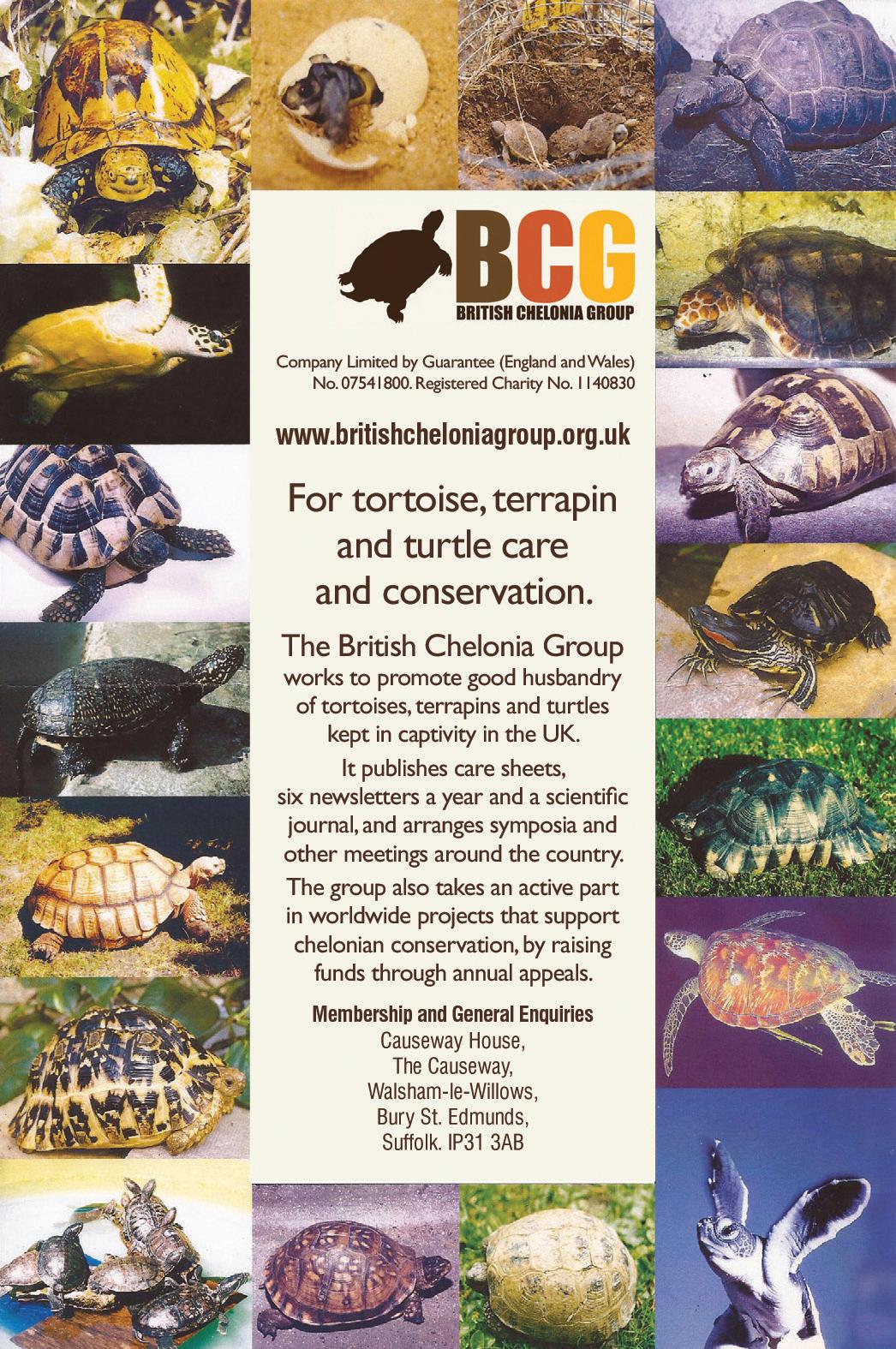

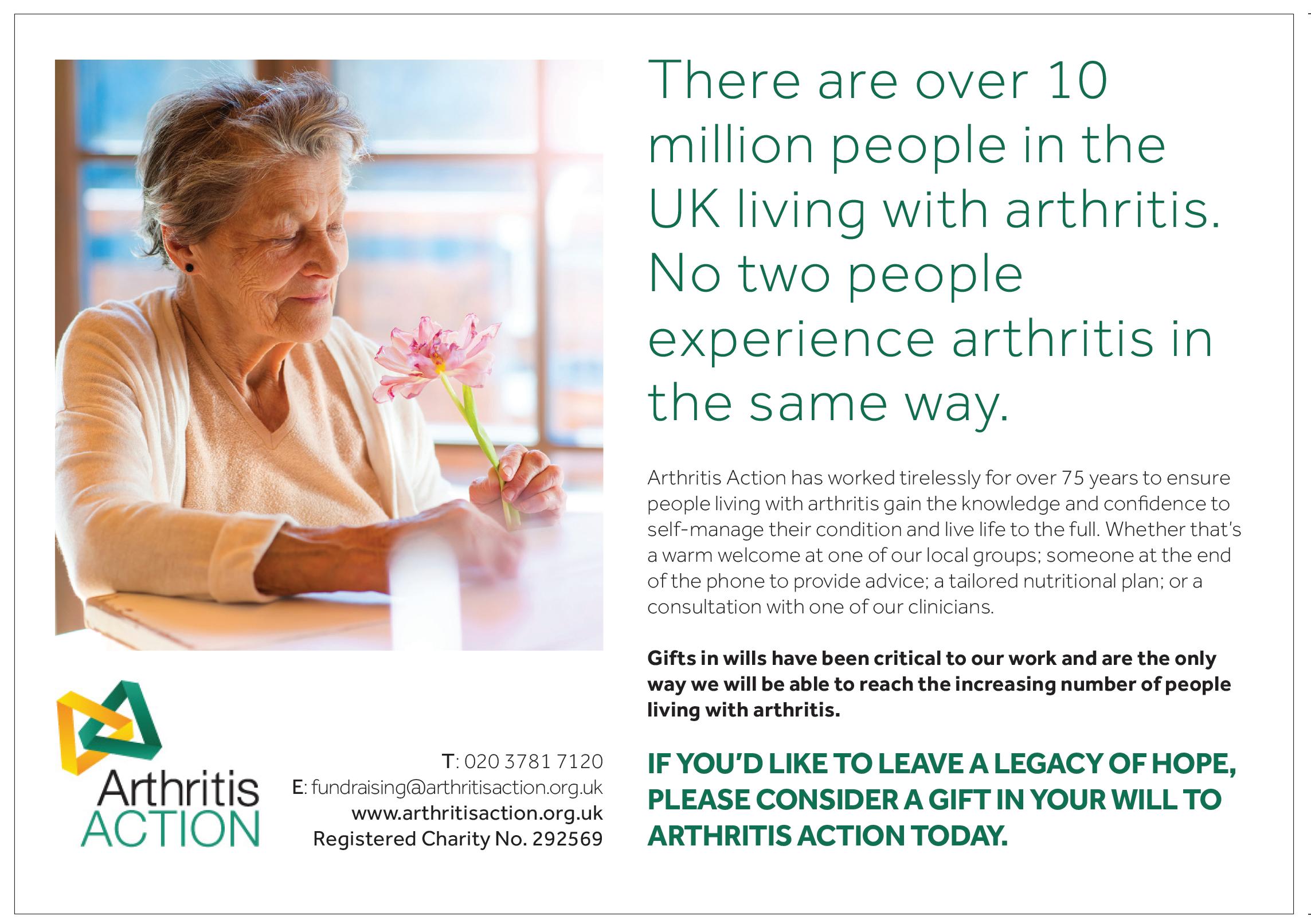

Across the world, the ability of children or indeed young adults to make decisions about issues concerning themselves is full of dilemma. Under UK law, the line between childhood and adult hood is 18 years of age1; the age of majority. This means for example, that an individual can of their own volition, vote, enter contracts (credit cards, take out loans) buy tobacco or get a tattoo. The law then allows for capacities at each age from 10 through 17, though in this article with regard to DNA testing, we will single out age 16, as now armed with a National Insurance number, minors may join the Army, get married, drink alcohol in a restaurant, get a full time job and have sexual intercourse. This is perhaps appropriate for most in todays’ UK society.
When it comes to medical treatment, then the law is very clear that the age of consent to a procedure is 18 and after this age, individuals have as many rights as adults. Under some circumstances, 16-year-old individuals can make medical decisions without consent of their parents and at younger ages than that, the degree of independent consent is reliant on their competence to understand the procedure – age alone is a not a sufficient criterion. Specifically, the test of these criteria is the Gillick test2 which relates to a child under 16 receiving contraceptive advice without her mother’s consent. Over time this has been used by the medical fraternity to gain consent from under 16's, provided they can demonstrate understanding of the nature and implications of the proposed treatment. A subset of this principle is the Fraser guidelines which specifically relate to welfare advice for under 16’s.
When considering a DNA test to determine a biological relationship (such as a paternity test), then it is important to remember that a human identity or paternity test is not a medical matter; it is quite different to other types of genetic test which are used for example, for disease diagnosis. The relevant legislation is the Human Tissue Act 1984 and Human Tissue (Scotland) Act 20063, which as an aside to its intention to clamp down on the
unauthorised use of human tissue as revealed in the Bristol Royal Infirmary enquiry,4 has captured the need for consent for the analysis of samples for a DNA test and which are intended for human identity testing. The Department of Health has produced helpful guidance5 and a good practice guide for companies like our own.
In addition, the Ministry of Justice operates an accreditation system for bodies “that may carry out parentage tests directed by the civil courts in England and Wales under section 20 of the Family Law Reform Act 1969”. This list is reconsidered every year and requires DNA testing companies to hold the key accreditation for calibration and testing laboratories, ISO/IEC 17025. We are pleased to say that we have been on “the list” for more than 14 years.
With regard to consent, then the first principle derives from the established laws of consent and the second from the Human Tissue Act 2004, where consent is required for possession of material from a human body that contains human cells (a buccal sample) with the intention of analysing the DNA. We must be satisfied that whoever is providing the consent for a DNA test is authorised to do so. We for example, take steps to ascertain the basis for parental responsibility and as the DNA testing organisation providing
the test, are satisfied that those consenting to the taking of a sample from the child, are authorised to do so. It is also important that the consent is given on the understanding that the nature and possible consequences of the test are understood.
Parental Responsibility refers to "all the rights, duties, powers, responsibilities and authority which by law a parent of a child has in relation to the child and his property".6 In real terms, this means having input into substantial matters affecting a child’s well-being, such as education, religion, medical treatments and appointing a guardian as well as having input with regards to holidays and extended stays outside the family home. Importantly, this also relates to legal proceedings involving the child and the registering/changing of a child’s name on a birth certificate. De facto, this applies to the non-medical matter of human identity testing using DNA technology, commonly known as for example, a paternity, sibling or indeed a grand-parentage test.
So, who has Parental Responsibility for a child? Well firstly, the mother always (and automatically) has Parental Responsibility. Intuitively, we might think this named individual would necessarily be the biological mother (the individual who gave birth to the child) and this is generally the case. Exceptions occur in the case of
surrogacy where the surrogate mother will have Parental Responsibility until it is relinquished with a Parental Order. Interestingly, if a surrogate mother is married, their partner will also have Parental Responsibility for the child.
There are various additional ways that a father can gain Parental Responsibility over a child, these are:
a) entering marriage or civil partnership with the mother, b) obtaining a Parental Responsibility order from a court, c) using a Child Arrangement Order, being named as a resident parent, d) having a Residence Order in place (prior to 22nd April 2014) and e) entering a Parental Responsibility Agreement with the mother. If there has been a marriage/civil partnership and then a divorce/dissolution, then the Parental Responsibility rights are retained.
Automatic Parental Responsibility is not conferred on unmarried biological fathers, unmarried partners (male or female), grandparents, other biological relatives or a step-father/
step-mother. Unmarried/non civil partnership fathers who (re-) register their names on a birth certificate after 1st December 2003 can gain Parental Responsibility.
We always ask for the mother’s consent to a DNA test if the child is under 16 and encourage her to participate in the test by giving a DNA sample. Our most common question is: “Why do you need that? I know I am the mum.” Well, we are each made up of half of the mothers DNA and half of the fathers – though until we test it, we don’t know which half ! By determining which portion comes from the mum, we can then be sure which DNA relates to the father and this greatly improves the statistics of an inclusion, i.e. that the man is in fact the biological father of the child.
If you have a case requiring a DNA test to establish parentage or would just like some advice on how to establish a human relationship using DNA, then please contact us, we would be pleased to help.
Notes
1 Family Law Reform Act 1969
2 Gillick vs West Norfolk and Wisbech AHA and DHSS [1985] 3 WLR (HL)
3 www.legislation.gov.uk/ukpga/2004/30/contents; www.legislation.gov.uk/asp/2006/4/contents
4 www.bristol-inquiry.org.uk/interim_report/toc.htm
5 www.Wales.nhs.uk/documents/DH_082624.pdf
6 The Children Act 1989, s3(1)
Dr Neil Sullivan, BSc, MBA (DIC), LLM, PhD is General Manager of Complement Genomics Ltd (trading as Dadcheck®gold).
Complement Genomics Ltd (trading as Dadcheck®) is accredited by the Ministry of Justice as a body that may carry out parentage tests directed by the civil courts in England and Wales under section 20 of the Family Law Reform Act 1969.
Please see: dadcheckgold.com
Tel: 0191 543 6334
e-mail: sales@dadcheckgold.com

WHAT DOES FINDERS INTERNATIONAL DO AND WHAT SERVICES DOES IT OFFER?
At Finders International, we are a probate genealogy company that specialises in tracing heirs to estates, properties, and assets worldwide. We offer a range of global research and support services, including locating missing legatees and beneficiaries all over the world, obtaining family documents, carrying out overseas bankruptcy searches, missing will searches and handling the difficult aspects of overseas assets such as multi-jurisdictional share portfolios, as well as carrying out all important family tree verification work for Statutory Will Applications. Our clients include solicitors, estate administration professionals, and financial institutions in the private sector, as well as local authorities, coroners, and hospitals in the public sector.
70 cases, as well as winning multiple awards, including Best Probate Research Firm of the Year at the Probate Research Awards for the past four years.
HOW HAS FINDERS INTERNATIONAL'S APPEARANCE ON BBC 1'S HEIR HUNTERS IMPACTED BUSINESS, AND HAVE YOU SEEN AN INCREASE IN INQUIRIES?
3
reclaim family heirlooms. Additionally, as a founding member of the International Association of Professional Probate Researchers, Genealogists and Heir Hunters (IAPPR), we are dedicated to raising the standards of our industry and promoting best practices. Overall, our commitment to excellence, professionalism, and client satisfaction is what sets us apart from other probate genealogy companies.
At Finders International, we are always looking for ways to improve our processes and better serve our clients and beneficiaries. Our plan for the future is to concentrate on improving our services by investing in new technologies and training for our staff.
WHAT ARE THE BIGGEST HIGHLIGHTS OF FINDERS INTERNATIONAL'S 26 YEARS OF EXISTENCE?
Finders International was founded in 1997 by our MD, Danny Curran, in a small office in Southwest London. Since then, we have experienced tremendous growth, expanding to over 150 personnel across four offices in North London, Yorkshire, Edinburgh, Dublin, and Sydney. As an unregulated industry, we have always focused on raising the standards of our industry and have looked to selfregulate as much as possible. We are proud to be a founding member of the International Association of Professional Probate Researchers, Genealogists and Heir Hunters (IAPPR), an international organization representing elite firms across the world. Additionally, we have been honoured to be featured on BBC 1's Heir Hunters for five series and over
Our appearance on BBC 1's Heir Hunters has raised the profile of probate genealogy among the public and helped them understand a previously unknown niche area of work. We receive numerous inquiries from people interested in delving into their family history, and some of the stories they share are of real historical interest. Additionally, we have had stories relating to beneficiaries in the press, demonstrating the continued interest that the public has in their family history and how it ties into the world of probate genealogy.
4
WHAT SETS FINDERS INTERNATIONAL APART FROM OTHER PROBATE GENEALOGY COMPANIES?
At Finders International, we believe that our commitment to excellence and our dedication to our clients sets us apart from other probate genealogy companies. We understand that dealing with estate and asset matters can be a difficult and emotional process, which is why we approach every case with empathy, professionalism, and attention to detail. Our team of highly skilled researchers and support staff work tirelessly to locate missing beneficiaries, assets, and wills, ensuring that our clients receive the best possible service. We are also proud to offer a range of pro-bono services, helping people reunite with lost family members or
We also recognise the vital role we play in helping legal professionals through the difficulties that can occur during the administration of an estate. We want to continue building strong relationships with our clients and help align the two industries of probate genealogy and legal practice by working together to promote best practices, ethical standards, and transparency.
Overall, we are committed to remaining at the forefront of the probate genealogy industry, providing exceptional service to our clients and helping families around the world discover their past and secure their future.
If you would like further information on Finders International and the services they provide, visit their website www.findersinternational.co.uk, call 0800 085 8796 or email quotes@findersinternational.co.uk

